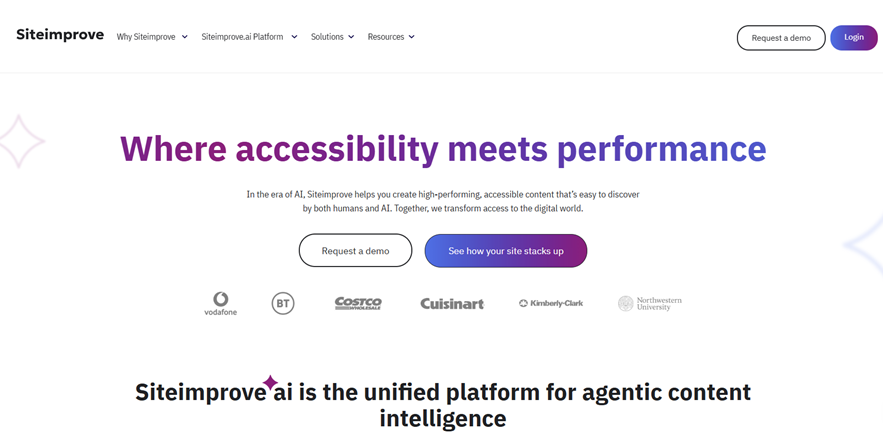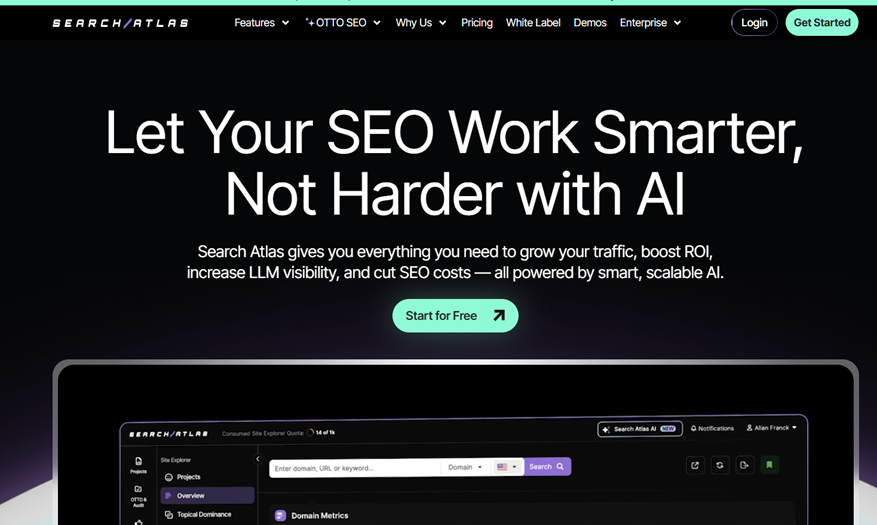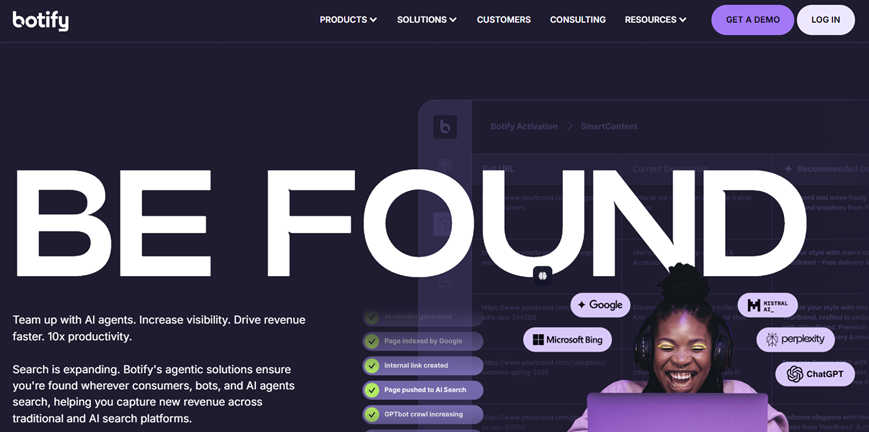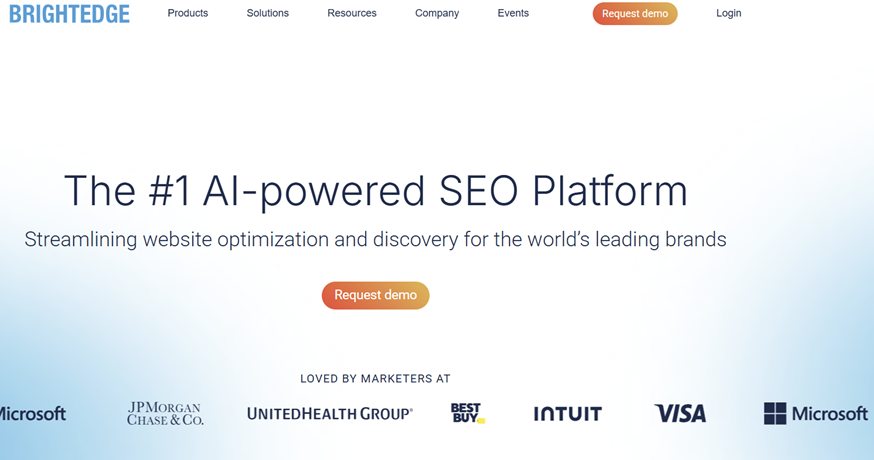Your SEO tools cost $2,000 a month. You've got rank tracking in one system, content analysis in another, and technical audits scattered across three more. Yet your competitors outrank you on every keyword that matters to your bottom line.
Here's what they know that you don't: Running five disconnected SEO tools costs you more than money — it costs you market share. While you waste hours copying data between dashboards and fixing broken exports, they're using integrated systems that spot opportunities automatically.
The numbers tell the story: Enterprise SEO platforms will hit $58.3 billion by 2035, an annual growth of 17.68%. Why? Because companies discovered that manual SEO doesn't scale. When you're managing thousands of pages across multiple markets, you need systems that turn data into actionable insights.
Leading enterprises use SEO automation to:
- Cut labor costs by 35% through automated workflows.
- Improve SEO performance with 23% more organic impressions in 90 days.
- Emulate the 15.6% of teams that save 10+ hours weekly by automating SEO tasks.
- Save 1-5 hours weekly on content creation and keyword ranking research.
This isn't another "top 10 best SEO automation software" listicle. We'll show you how enterprise teams choose and implement SEO automation tools that drive measurable growth. From technical foundations to strategic capabilities, you'll learn what separates successful SEO strategy from those stuck in spreadsheet hell.
Want to stop losing time and leads between disconnected systems? Here are the AI tools shaping how teams optimize their SEO efforts in 2025:
Top SEO automation tools for 2025
Six-figure platform decisions demand more than feature comparisons. Enterprise SEO tools shape how teams work, how quickly they spot opportunities, and ultimately, how much revenue they drive through organic search.
The market leaders distinguish themselves across three critical dimensions:
- Technical depth: Processing millions of URLs while catching subtle SEO issues that cost revenue
- Integration capabilities: Connecting your entire marketing stack to drive decisions from unified data
- Automation intelligence: Turning complex data into clear actions without constant human oversight
Here's our analysis of each SEO automation tool reshaping enterprise SEO:
Siteimprove.ai: The complete enterprise platform

Siteimprove.ai tackles the one problem other SEO tools ignore: fragmentation. While most tools have you bouncing between tabs and exporting CSV files, this SEO automation software turns tedious SEO tasks into smooth automated routines.
In fact, we refer to it a platform because, unlike single-point solutions, Siteimprove.ai unifies accessibility, analytics, content strategy and SEO. Using a shared data layer with cross-product workflows, automation, and integration, it enables teams orchestrate outcomes across the entire digital performance lifecycle, not just run a single task.
Need to track keywords across 20 markets? Done. Want to spot technical SEO issues before they tank your rankings? Also done. It's an SEO strategy powerhouse that doesn't just show you problems, it fixes them automatically.
The platform's approach to SEO performance monitoring is refreshingly different. Instead of drowning you in data, it surfaces actual revenue-driving opportunities. Other tools might tell you your traffic dropped; Siteimprove.ai tells you exactly why and what to do about it.
Our platform connects data points others miss entirely. For example, when a JavaScript rendering issue threatened a client's product pages before Black Friday, our system caught it before sales dropped. In another case, we spotted a competitor's content pivot two weeks before traditional analysis would have surfaced it. Our clients report concrete wins, like 50% less time spent fixing technical issues.
Stand-out features include:
- Real-time monitoring across 1,000+ metrics
- Automated scanning for ADA, HIPAA, and EU compliance standards
- AI-powered pattern detection across the entire digital footprint
- Unified dashboards that break down silos between teams
Siteimprove built its platform specifically for enterprise complexity. It handles JavaScript rendering, dynamic content, and regulatory compliance as core functions. For teams managing sprawling digital properties across multiple markets, this is essential.
It’s best suited for enterprise organizations wanting concrete next steps for every flagged item.
Search Atlas: AI power meets SEO automation

Search Atlas brings something different to enterprise SEO: pure AI horsepower. Its OTTO SEO agent doesn't just analyze pages, it executes optimizations directly on websites. That means automated title tags, meta descriptions, and image alt text without the usual back-and-forth between tools.
The platform's 5.2 billion keyword database reveals opportunities other tools miss entirely. But Search Atlas's real strength shows in its daily ranking updates: When Google's algorithm shifts or competitors adjust their strategy, users know immediately.
Stand-out features include:
- Direct Google Search Console integration (no web scraping)
- Autonomous technical SEO fixes
- Real-time SERP monitoring through OTTO Pixel
- Full article generation with topical mapping
- Enterprise features at mid-market pricing
It’s best suited for teams who need AI-driven execution, not just recommendations.
SE Ranking: Enterprise power without enterprise pricing

SE Ranking carved out its space in the market by proving that enterprise SEO doesn't have to cost enterprise money. Since 2013, its platform has grown to support over 1.5 million SEO professionals, and it offers unlimited scalability without the usual price tags.
The platform's core strength lies in pure horsepower. With capabilities to track 15,000 keywords daily, monitor 20 competitors per project, and access more than 7.2 billion keywords and 2.2 billion domain profiles, SE Ranking matches the raw power of platforms that cost three times as much.
Stand-out features include:
- Boundless rank tracking with JavaScript rendering
- Advanced AI-driven content creation tools
- Full API access for automated, custom enterprise workflows
- Looker Studio connectivity for automated dashboards
- Cross-team collaboration with role-based access
It’s best suited for growing companies that need enterprise capabilities without enterprise costs.
Botify: The technical SEO powerhouse

Most SEO platforms skim the surface of technical issues. Botify dives deep into your site's architecture, processing a million pages in three hours while others are still loading their dashboards. Its URL-first approach means nothing escapes analysis — mobile pages, AMP versions, alternate language variants, even those forgotten landing pages from 2020.
What sets Botify apart? Its unified data platform connects crawl data, log files, keywords, and analytics in ways that expose hidden technical issues. Want to know why Google isn't indexing your highest-value pages? Botify shows you exactly where the crawl budget leaks are hiding.
Stand-out features include:
- Pages crawling that’s 10-40 times faster than the competition
- A tool that implements SEO changes without dev team bottlenecks
- Automated workflows for sitemap generation
- JavaScript rendering that processes complex SPAs in hours, not weeks
It’s best suited for enterprise teams with complex technical architectures who need more than basic crawl reports.
BrightEdge vs. Conductor: Old guard meets new demands

Let's talk about the enterprise SEO platforms everyone name-drops in RFPs. BrightEdge and Conductor dominated the space when SEO meant quarterly reports and basic rank tracking. But in 2025, they're racing to keep up with specialized competitors.
BrightEdge brings serious data muscle with its Data Cube X, which analyzes billions of data points for search trends. Its AI tool suite combines Catalyst, SEO Copilot, and BrightEdge Insights to handle the basics. But at $14,000+ per year for enterprise features, you're paying premium prices for capabilities other platforms include as standard.
Conductor takes a different path, focusing on content workflows and team collaboration. Conductor bet everything on making SEO accessible to non-technical teams, and it paid off. The platform scored 4.4 out of 5 in the 2025 Forrester Wave (crushing BrightEdge's 2.2) by doing something radical: building software people don't hate using. Your content team might actually thank you for this one.
The catch? Neither platform handles:
- Accessibility compliance
- Digital governance
- Technical SEO automation
- Multi-market content optimization
- Integrated analytics beyond basic SEO metrics
Both platforms are best suited for enterprise teams who prioritize established reputations over technical innovation.
When humans and AI join forces, you get content optimization that works
The content optimization game changed when AI entered the picture. Almost every content marketing team now has an AI writing tool.
But look closer and you'll spot a pattern: The teams ranking on page one aren't letting robots write their content. They're using AI to uncover insights humans would miss, then turning those insights into content that actually helps their audience.
Smart teams let machines do what machines do best: analyze mountains of data to spot patterns. Then humans step in to turn those patterns into stories worth reading. While their competitors churn out AI-generated articles that sound like everyone else's, these teams use SEO automation tools to:
- Spot content gaps before they impact rankings.
- Scale optimization across thousands of pages.
- Turn search intent data into content strategies.
- Deploy changes across multiple markets instantly.
Here's how leading teams make content optimization work at scale:
Let AI handle the research while humans handle the writing
Look at your last batch of "AI-optimized" content. Does it sound like everyone else's? That's because most teams let machines handle both research and writing. It's like hiring a detective to solve a case, then asking your Roomba to write the police report.
The reality? 67% of marketers report better content quality using AI, but not because AI writes their content. The successful ones use AI to uncover what their audience actually wants, then let human writers deliver it.
MarketMuse and Siteimprove shine here. MarketMuse's AI analyzes thousands of competing pages to reveal content gaps and opportunities, while Siteimprove's Agentic Content Intelligence (ACI) helps you understand exactly what your audience needs.
Their combined insights help you:
- Locate search intent patterns your competitors missed.
- Identify content gaps your editorial calendar should target.
- Find topic clusters that signal market shifts.
- Create semantic relationships Google expects to see.
While most companies take all this juicy AI research and feed it right back into more AI, savvy teams let AI dig through the data mines while humans do the work that matters: creating content that makes readers think "finally, someone who gets it."
Scale content optimization across your entire site
Your content team just dropped their quarterly report on your desk: 157 new blog posts, 42 landing pages, and enough meta descriptions to fill a Stephen King novel. Plot twist: Half of it already needs updating. Again.
Welcome to enterprise content management, where "we'll do it manually" belongs in the same fantasy category as "the check is in the mail" and "I'll only have one more cookie."
Here's a fun story from the content trenches: A global enterprise thought it had content expansion figured out. Its process looked beautiful on paper (don't they all?). Reality had other plans. By the time it finished localizing content for their second market, its first market's content was already collecting digital dust. It was a classic content death spiral.
Enter Siteimprove and MarketMuse, the dynamic duo of content scaling. Siteimprove's platform carved through 20,000 pages across 12 markets faster than your marketing team downs their morning espressos. Meanwhile, MarketMuse's AI made sure each piece hit the mark for local audiences.
Modern content scaling like this means:
- Content audits that actually find problems (not just count your Oxford commas)
- Global updates that don't make your German office cringe
- Version control that tells you exactly who broke the website (and when)
- Bulk updates that work the first time (revolutionary, we know)
Think of it as giving your content team superpowers, minus the radioactive spider bites. Siteimprove handles the heavy lifting while MarketMuse ensures you're not just scaling fast — you're scaling smart. Because in 2025, the only thing worse than bad content is good content that's stuck in approval purgatory while your competitors eat your digital lunch.
Turn search data into content strategy
Let's peek behind the curtain of your content planning meetings. Someone mentions "data-driven decisions" while staring at last year's keyword volumes. Another brave soul suggests writing about "industry trends" based on what they overheard at a conference. Meanwhile, your competitors are living in 2025, using AI to predict what your audience wants before they know they want it.
Here's what happens when Siteimprove and MarketMuse take over:
- Automated alerts on traffic dips
- Highlighting content gaps
- Keyword research with topic suggestions based on real data
- Performance tracking that makes your analytics team smile
The days of throwing content at the wall to see what sticks are over. Modern platforms don't just tell you what's trending; they tell you why it matters, who's searching for it, and how to own the conversation before it even starts. Because in the time you spent reading this paragraph, your audience's search behavior probably changed. Good thing the machines are watching.
Automate the technical stuff that matters
No one got into marketing to manage schema markup. Yet here you are, drowning in meta tags and internal links like a web developer who lost a bet.
Think your technical SEO is under control? Siteimprove's seen that movie before. Its crawlers regularly uncover sites that look perfect on the surface but are secretly held together with digital duct tape and a prayer. Meanwhile, MarketMuse keeps your content structure from turning into the SEO equivalent of a junk drawer.
Here's what proper automation looks like:
- Alerting on technical face-plants before Google catches them
- Content that’s structured like it was written by someone who actually knows what they're doing
- Meta tags that make sense, instead of keyword soup that reads like a caffeinated thesaurus
- Internal linking that follows strategy, not your last panic attack
Your SEO team didn't master their craft to spend eight hours hunting down broken redirects. Let Siteimprove and MarketMuse handle the digital grunt work while your experts tackle the challenges that need human brainpower.
Stop drowning in data, start swimming in insights
Your analytics dashboard looks like a Vegas slot machine having an identity crisis. Bounce rates, time on page, scroll depth, social shares, and backlinks; somewhere in there is supposedly the secret to your SEO success.
Think your current setup is working? Let's play a game called "What's Really Happening on Your Site":
- How many pages got zero visits last month?
- Which content makes visitors stick around?
- What's your best-performing page about?
- Why does that blog post from 2021 still drive traffic?
If answering these took longer than ordering lunch, you've got a problem.
Siteimprove shows you exactly which pages need help and why, in clear language. MarketMuse jumps in with the "what next," turning those insights into content that drives traffic. It spots patterns in your successful content and makes suggestions to turn that insight into content strategy.
Together, they turn your data mess into a game plan:
- Siteimprove flags the pages bleeding traffic.
- MarketMuse shows you how to fix them.
- Your team gets to focus on creation instead of calculation.
- Your boss stops asking why the numbers look weird.
You're here to create content that works. These tools help you prove it's working.
Want proof it works? Cuisinart cut its campaign management time in half after switching to Siteimprove's platform. Its team now launches new campaigns in hours instead of weeks, with MarketMuse ensuring each piece of content hits the mark.
The tools matter, but your process matters more. We've run thousands of campaigns and found this framework works every time, whether you're launching a new site or fixing an old one:
| Campaign Step | What You Need to Do |
|---|---|
| 1. Audit |
|
| 2. Plan |
|
| 3. Create |
|
| 4. Measure |
|
| 5. Optimize |
|
At each step, Siteimprove's automation flags issues you'd miss manually, from broken links to content gaps. And while Siteimprove keeps watch, MarketMuse plays strategy coach by showing you which content moves matter. That technical audit that used to eat up your whole month? It now runs while you sleep.
Content briefs that took hours to research pop up in minutes. Performance reports that required three different tools now live in one dashboard. That's what good automation does: it handles the grunt work while you focus on strategy.
The secret isn't working harder, it's letting robots do what robots do best so humans can do what humans do best. Like coming up with ideas that don't sound like they came from a chat bot having an existential crisis.
AI doesn't replace SEO teams, it just makes them look good
Remember when everyone thought AI would replace SEO jobs? Turns out it's more like getting a really smart intern who never sleeps and really reads all your analytics reports.
Your SEO team knows what content should look like. They understand your brand voice, your audience's needs, and why that one competitor keeps eating your lunch in search results. What they don't have is time to analyze 50,000 pages while also creating content that converts.
Enter Siteimprove and MarketMuse's AI. Siteimprove's predictive analytics spot traffic drops before they become traffic disasters. It catches technical issues faster than your dev team catches typos in their commit messages. Meanwhile, MarketMuse's AI digs through mountains of content data to show you exactly what topics matter to your audience right now.
Here's what happens when our AI joins your SEO team:
| Human Expertise | AI Enhancement |
|---|---|
| Content strategy | MarketMuse analyzes thousands of pages to reveal gaps and opportunities you’d never find manually. |
| Technical SEO | Siteimprove's crawlers catch issues, freeing your team from constant monitoring. |
| Performance analysis | Real-time insights show exactly which content moves are working (and which aren't). |
| Competitive research | Spot market shifts and content opportunities before your competitors notice them. |
But here's the real benefit: Your team spends less time gathering data and more time using it. They're not replacing spreadsheet formulas or manually checking meta descriptions. They're building strategies that work, creating content that converts, and taking long lunches because everything's running smoothly.
When Siteimprove's AI flags a technical issue, it doesn't just say "fix this." It shows you why it matters and how it affects your traffic. When MarketMuse suggests a content update, it's based on deep analysis, not some generic best practices list from 2019.
AI isn't here to take your job. It's here to do the parts of your job that made you consider a career change in the first place.
Stop reading, start automating
Your SEO stack needs an upgrade. You know it, your team knows it, and your competitors definitely know it. But before you start signing checks, let's talk about what actually works.
First, audit your current setup:
- How many tools do you pay for monthly?
- Which ones talk to each other?
- What manual tasks eat up most of your time?
- Where do your data and reports live?
Next, pick your battles. Start with the stuff that hurts most:
- Technical issues that keep popping up
- Content updates that take forever
- Reports nobody reads but everyone needs
- Data scattered across too many dashboards
When you're ready to make the switch, do the following:
- Get your team on board (bribe them with pizza if needed).
- Start with one key process, like technical audits or content planning.
- Let Siteimprove handle the technical heavy lifting.
- Use MarketMuse to guide your content strategy.
- Document what works (and what doesn't).
Looking ahead? SEO automation isn't slowing down. More companies are ditching their disconnected tools for unified platforms that actually work together. The question isn't if you'll make the switch, it's whether you'll do it before or after your competition.
Ready to stop reading and start automating? Get a demo and see how the best SEO automation software can improve your SEO workflow.

Saphia Lanier
Marketer. Journalist. Strategist. A powerful combo for B2B SaaS brands looking for customer-centric content that attracts and converts. Saphia's 18 years in digital marketing and magazine/newspaper writing prepped me to develop well-researched long-form content that edutains and drives action.
